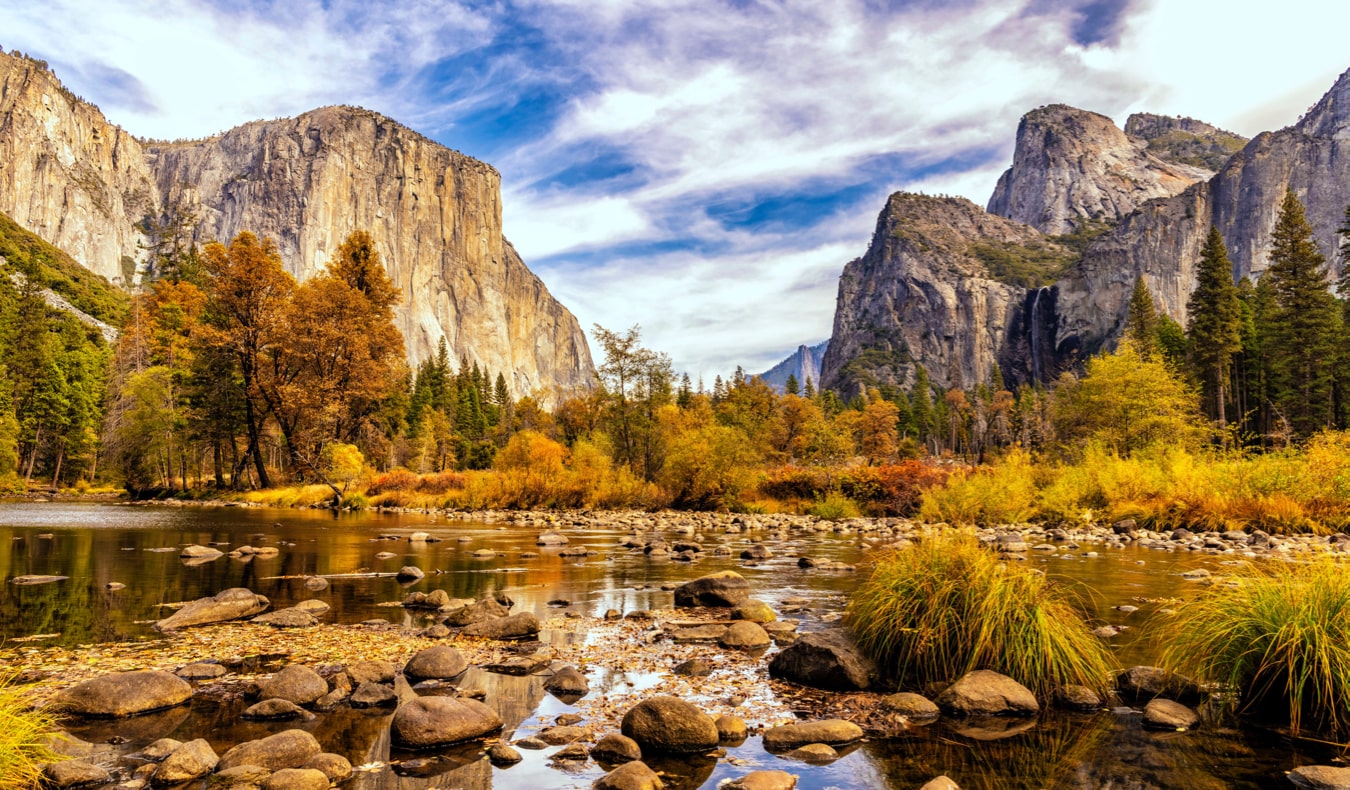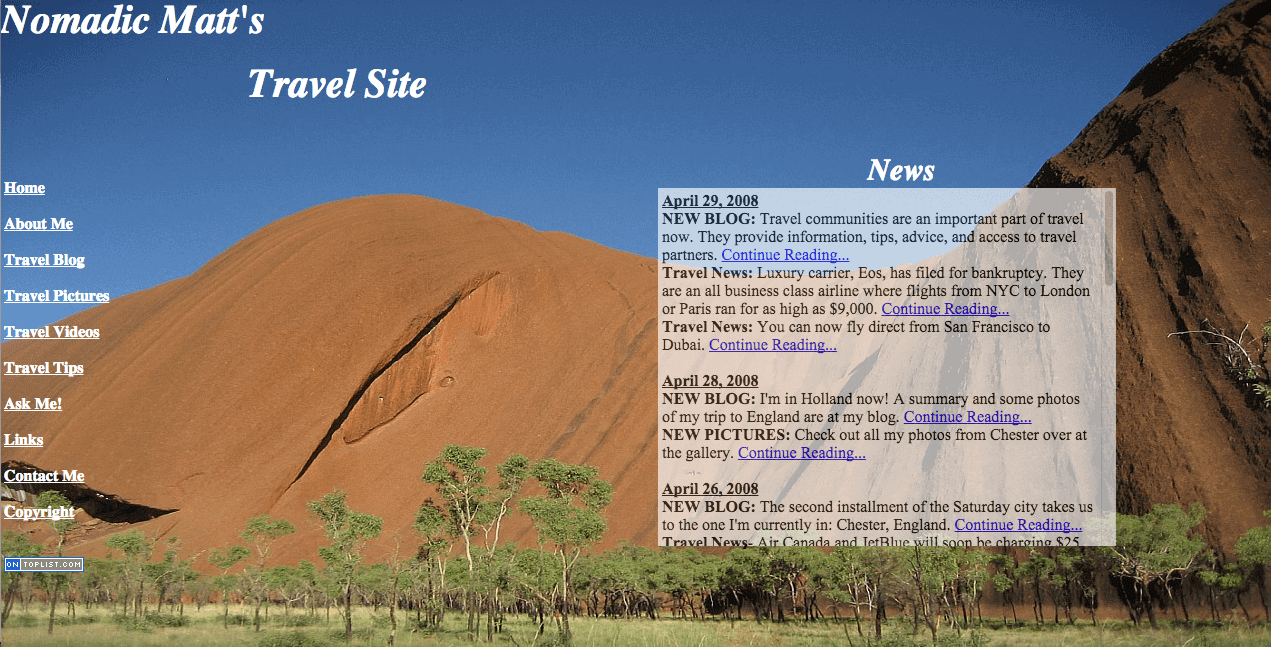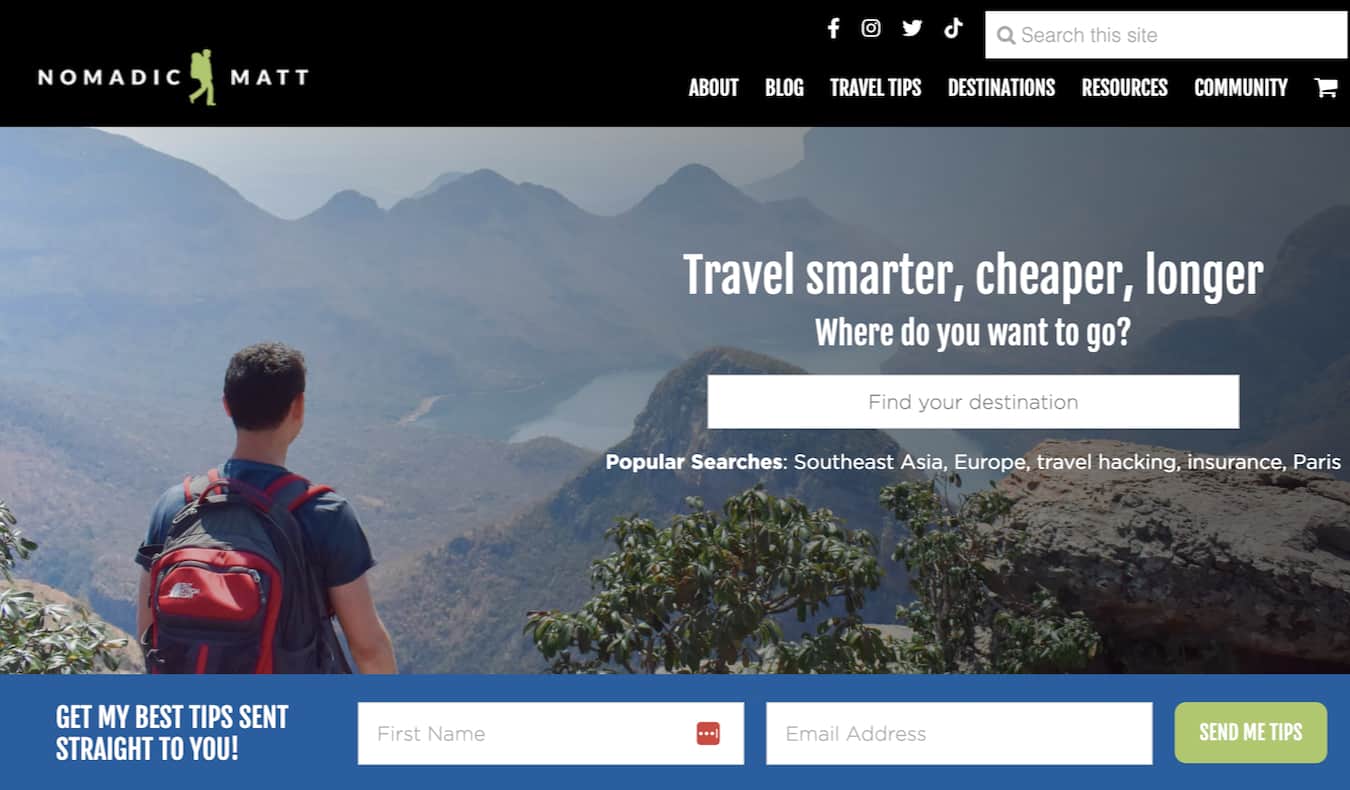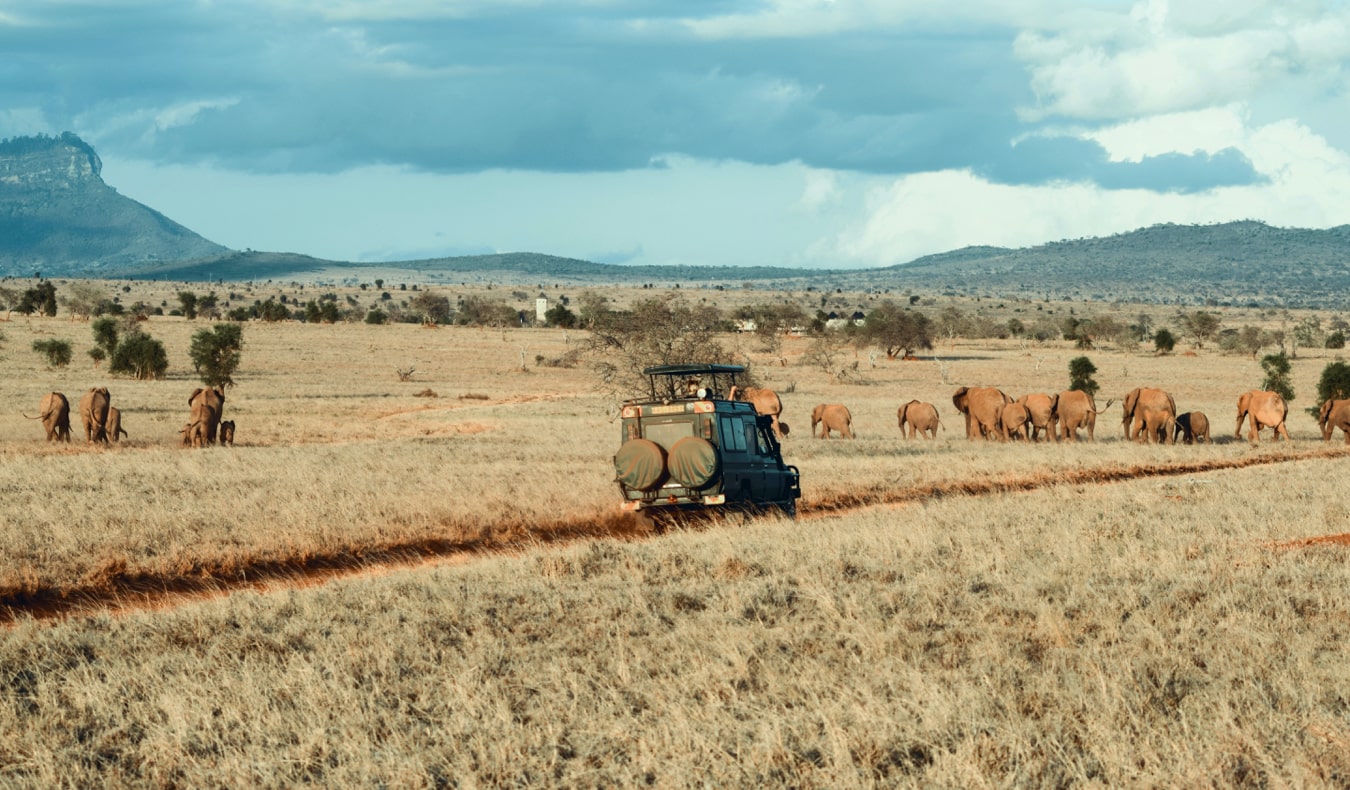
Last Updated: 5/17/23 | May 17th, 2023
A few years ago, I was in San Francisco to visit the Google Travel offices, where we spent a lot of time geeking out over travel booking data and metrics. One of the stats that stood out for me was that most consumers spend over 40 hours and look at over 20 websites researching their trip.
When I started planning my first round-the-world trip in 2005, there weren’t as many online resources. I remember a blog on backpacking Europe (basically what a girl did on her study abroad and her notes from the road), a couple of online forums, and random websites here and there.
My trip planning consisted mostly of using guidebooks.
Today, we have thousands of blogs, travel forums and online communities, travel apps, Youtube channels, Instagram and TikTok accounts, sharing-economy websites, and everything in between.
You can find information for anywhere you want to go.
No destination is too obscure.
There is a figurative firehose of information online.
But, in this sea of endless information, how do you know what information and advice are accurate and trustworthy, especially when so much content is sponsored by companies?
Like you, I spend a lot of time researching destinations before I go. I read blog posts, books, trip reports, hostel reviews, buy guidebooks, and leave no stone unturned.
I love digging deep into the places I’m traveling to. It makes the trip seem real and gives me the feeling like I’m unearthing deep secrets.
Planning a trip gives you ownership of your journey. It’s an integral part of the travel experience.
But, since I’ve been looking up information online and working in the travel industry for years, I can spot the BS/paid/sponsored content really easily.
There’s a lot of bad information out there that will lead you astray.
And today I want to help you spot it.
(Note: I’m going to break down my thoughts in extreme detail, but it actually doesn’t take that long to process all this. I’ll give you some perspective at the end. It’s not as long as you think!)
Part One: Factors to Consider When Reading About Destinations
1. Sponsored Content
Whenever I come across an article, I scroll to the bottom to see if it is “sponsored.” Sponsored content is (a) when a blogger is given a trip or product in exchange for a review or mention on that blogger’s website, or (b) content that is basically advertising or marketing material (think some “awesome” contest they are telling you about).
While organized press trips have occurred in the travel business for decades (and I’ve done them), sponsored content is something different.
A press trip is an unpaid experience where writers visit a destination in order to write about it. In this case, there’s no exchange of money. And, while there’s probably a little quid pro quo, I think when compared to sponsored content, it’s more honest. (I still take press trip content with a grain of salt though).
A sponsored post always has an exchange of money. That’s what changes the dynamic for me. That makes it marketing (for reasons that tie together below). A person was paid specifically to write nice things.
I’ll read the article (it still might be useful) but I don’t put as much weight into the advice as I would an unsponsored post. After all, the writer was paid to write about the place and there is a natural human inclination to sugarcoat the negatives if we’ve been paid to write about a place or product.
When I see “Thanks for the free trip, (insert tourism board name). All opinions are my own” without explanation, I’m also wary. What was free? What was paid for? Did they receive money? How do I know what is true and what isn’t?
Thus, I’m usually more skeptical of the content unless I see clearly what was sponsored.
When I went to Islay, the tourism board covered a lot of my trip: “Visit Islay provided the car and accommodation and also connected me to distilleries so I could get the behind-the-scenes tours for this article. Meals, flights, and transportation to and from the island — as well as all that whisky I bought — were at my own expense. They did not pay me directly for coverage.”
This is what I look for. I want the author to be clear on what was and wasn’t paid for – because that will directly impact some of the other important things to keep an eye on.
2. Replicable Experiences
If the writer is writing about an experience that I can’t do or a situation I can’t replicate, the advice isn’t useful to me as a reader. It’s great that someone got to do something cool like eat at a three-star Michelin restaurant and cook dinner with the chef — but how does that really help me experience the place?
How will that make my trip better?
Those kinds of articles make for fun stories but nothing more. When I’m researching a destination, I don’t want a fun story. I want a helpful story.
3. Detailed Content
How detailed is the article? The more facts, figures, and other details they include, the more I know they know their stuff. For me, advice that is detailed, practical, and replicable is the best kind of advice. I look for blogs and content that give me insight into a destination or product like I would expect from a guidebook or magazine.
All these signals tell me, “This website has quality and trustworthy content and I should use it to plan my trip.”
This is why whether or not the content is sponsored/branded/whatever term people use is so important to me because the more the writer is paying their own way and doing what I would do, it’s more likely to include the nitty-gritty facts and figures that will be useful to me as I plan my trip.
4. Bigger Picture
I look at that content within the bigger picture of their website. If I come across an article and I like what I’m reading, sponsored or not, I click around the website a bit more. If this blogger tends to do the kind of activities I like to do, I think to myself, “OK, we have a similar travel style. This person’s advice is going to benefit me.”
If I look around a website and see they mostly pay their own way, have detailed content, and are in the trenches like the rest of us, I’m OK with the small amount of sponsored content I see because, in my mind, it will be more fair and balanced than someone who does mostly paid trips. Bloggers have to pay their bills, after all.
5. Website Appearance
What does their website look like? Does it look loved? Is the design from 1999, or does it look like someone keeps the site up to date?
While looks don’t 100% correlate to quality food, you’re more likely to go “the food is probably good here” if the restaurant looks clean, organized, and renovated.
For example, look at my site:
In 2008:
Now:
Which one would you trust more? (Exactly. The newer version.)
6. Are They Too Negative?
There are so many factors that go into whether or not you like a destination: the people you meet, the weather, the ease with which you got around, whether someone in your dorm snored, and so much more! When I look at someone’s opinion on a place, I look to see if they are just ranting or are truly being fair. “This place was terrible and you should never go” is a rant that should be taken with a grain of salt. Read it, file it away, but mostly ignore it.
Years ago, I went on a rant about Vietnam and swore I would never go back. Since then, I’ve grown as a writer and a person. I had to add a little blurb at the end of the article saying this was my experience but you should go and experience it yourself.
That article stays up because it’s part of the site, but I cringe when I read it. It’s not the type of article that gives an accurate picture of a place nor is it one you should use when you plan your trip. Avoid articles like that.
7. Timely Content
Lastly, how old is the article? When was it last updated? Travel changes so rapidly that an article that was written five years ago and hasn’t been updated since is one I don’t value. If the article hasn’t been updated within the last two years, skip it!
Part Two: What to Consider When Researching a Company
1. Most Reviews are Negative
First, when it comes to using a company or booking website you don’t know, it’s important to remember one thing: the majority of reviews are most likely going to be negative.
Consumers use review sites to complain, not to praise. It’s almost always how some company screwed them over. While that is sometimes the case (no company is perfect 100% of the time — and it’s not just obscure companies; I’ve had friends have terrible times trying to get a refund from Expedia), most of the time it’s because someone didn’t read the fine print.
So that’s the most important thing to remember: consumer reviews always tilt negative in the travel space, so you shouldn’t be too worried if a company has too many negative reviews (the devil is in the details, not some star rating!).
2. Consider Why a Review is Negative
When looking at consumer reviews, I look to see why these people are having a negative experience. For example, if most of the negative reviews for a tour company talk about how their guide didn’t know anything, I begin to think, “Maybe this tour company isn’t that good.”
But if the negative reviews are mostly “THIS IS THE WORST COMPANY EVER BECAUSE MY HOTEL WAS ONLY 2 STARS AND I EXPECTED 5 STARS FOR THE $500 I PAID!” then I’ll ignore those specific negative reviews.
To me, these kinds of reviews are just rants, not helpful.
3. Expert Opinion
What do travel writers, magazines, and newspapers say about this company? Do they match the negative consumer reviews, or do they paint the company in a different light? If tour company X has tons of negative consumer reviews but the majority of professionals say it is good, I’ll go with the professional opinion. If there’s a disconnect between what consumers say and what the majority of experts say, I trust the experts.
That said, I’ll also look to make sure the experts aren’t being paid to say what they are saying. A lot of travel magazines get affiliate payments or commissions from travel/tour companies. Before I weigh their opinion, I’ll double-check to make sure they aren’t getting paid to say it.
4. Reviewing Reviews
Next, consider the following five points when looking at reviews:
How Often a Reviewer Posts – When looking at user-generated reviews, I want to see how often a user posts (most sites show you). If someone posts just once and writes a scathing review, chances are they are trying to vent because they didn’t get what they want.
Beware Too-Positive Reviews – People don’t like to hurt other people’s feelings, so on a lot of the sharing-economy sites, people sugarcoat their reviews, because these hosts or guides aren’t a faceless corporation.
If some guy gave you a tour or if you stayed in someone’s house and it sucked, you’ll feel bad leaving a very negative review because you met that person and formed a (fleeting) relationship with them.
Beware a Lack of Details – This is how I ended up in an Airbnb that was directly above a bar. Everyone said “it was noisy,” but NYC is noisy, so I just assumed that is what they meant.
Since that horrible incident, I only trust reviews that are specific, detailed, and clear on what was good and what was bad. “I had a great time” or “This place was so so” doesn’t tell you anything and those reviews should be ignored.
Beware Paid Placements – Next, make sure the top reviews aren’t paid placements. The majority of booking sites allow companies to pay extra for higher or top “recommended” placement. All those top results? Usually paid to be there.
So do what I do: ignore the top-recommended properties, sort by price, and then figure out where to book.
Are There Pictures? – Finally, when I look at booking sites, I also like to see what pictures people who have stayed there have posted. Of course, having a professional photographer take a picture vs. someone taking a picture with their phone are two very different things, but I like to at least get a sense of what the room looks like in a real-world setting.
None of these points make or break my planning on their own. I look at everything and see what the complete picture looks like. I look for patterns and averages. That is something you can’t really fake. Trust the average.
This might sound like it takes a lot of work, but it’s really just a long, drawn-out written version of what I keep in mind as I research. In reality, this list only takes a few minutes to run through in your head.
By looking at all these factors, you’ll rarely end up at a place you don’t like, using a company that screws you over, or getting inaccurate and unhelpful information.
Book Your Trip: Logistical Tips and Tricks
Book Your Flight
Find a cheap flight by using Skyscanner. It’s my favorite search engine because it searches websites and airlines around the globe so you always know no stone is being left unturned.
Book Your Accommodation
You can book your hostel with Hostelworld. If you want to stay somewhere other than a hostel, use Booking.com as it consistently returns the cheapest rates for guesthouses and hotels.
Don’t Forget Travel Insurance
Travel insurance will protect you against illness, injury, theft, and cancellations. It’s comprehensive protection in case anything goes wrong. I never go on a trip without it as I’ve had to use it many times in the past. My favorite companies that offer the best service and value are:
- SafetyWing (best for everyone)
- Insure My Trip (for those 70 and over)
- Medjet (for additional evacuation coverage)
Want to Travel for Free?
Travel credit cards allow you to earn points that can be redeemed for free flights and accommodation — all without any extra spending. Check out my guide to picking the right card and my current favorites to get started and see the latest best deals.
Need Help Finding Activities for Your Trip?
Get Your Guide is a huge online marketplace where you can find cool walking tours, fun excursions, skip-the-line tickets, private guides, and more.
Ready to Book Your Trip?
Check out my resource page for the best companies to use when you travel. I list all the ones I use when I travel. They are the best in class and you can’t go wrong using them on your trip.






